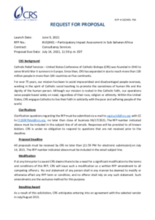The Feed the Future Global Supporting Seed Systems for Development (S34D) initiative is a five-year Leader with Associates Cooperative Agreement Award, funded by Feed the Future through the Bureau of Resilience and Food Security (RFS) and by USAID through the Bureau for Humanitarian Assistance (BHA). Catholic Relief Services is leading this consortium with the support of a team of Consortium Partners: the Alliance for Bioversity International and CIAT (ABC), the Pan-Africa Bean Research Alliance (PABRA), Opportunity International (Ol), and Agri Experience (AE). S34D’s Life of Activity runs from August 2018 through August 2023. The overarching goal of S34D is to improve the functioning of national seed sectors in an inclusive manner in our focus countries. The activity aims to meet its goals by increasing the capacity of seed systems to sustainably offer quality, affordable seeds of a range of crops (Objective 1) and increasing collaboration and coordination among all seed systems actors and actions (Objective 2). The S34D initiative is structured according to three inter- related seed systems: the formal seed system; the informal seed system; and emergency seed provisioning. This integrated approach is further strengthened by cross-cutting intermediate results that seek to improve policies and practices that support pluralistic seed systems, rather than focusing on individual parts of each system.
Objective of the consultancy
These Terms of Reference describe the role of the Participatory Impact Assessment (PIA) consultant as part of a team that will undertake S34D Activity 1.3.1.1, as described in Annex 2. The consultancy primarily aims to undertake a participatory impact assessment of selected emergency seed interventions to address the question of how these interventions may have impacted the livelihoods of the male and female smallholder farmers and male and female seed suppliers involved. Secondary objectives are to collect data through the PIA to contribute towards understanding the impacts of the interventions on the informal and formal seed systems (including seed markets) in the local area, and to provide inputs to workshops to help identify key ‘best practice’ approaches for the design and implementation of emergency seed interventions in order to achieve specific livelihood impacts, e.g. on household food security, nutrition, income, on seed markets, etc. As such, the PIA Consultancy forms part of a broader project (S34D Activity 1.3.1.1) which is described in Annex 2.

